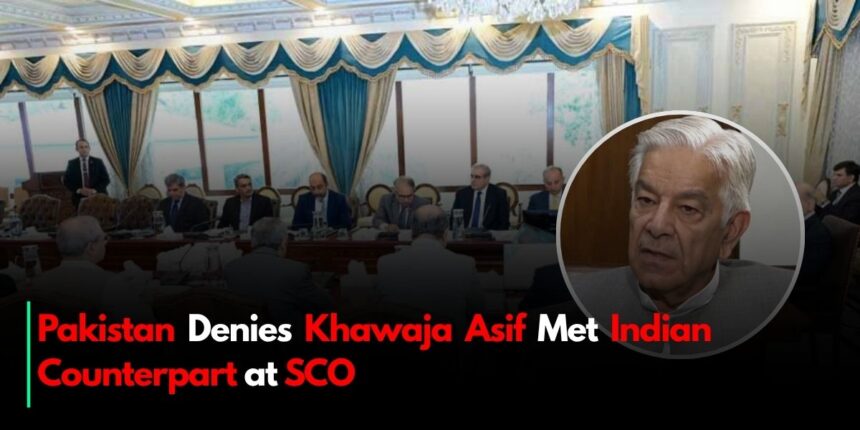This week, the Shanghai Cooperation Organization (SCO) Defense Ministers’ meeting started in China. Pakistan’s Foreign Office promptly denied claims that Defense Minister Khawaja Asif could meet with India’s Rajnath Singh one-on-one. Islamabad made it clear that there is no arrangement for a meeting like this, even though both ministers are at the conference.
Hearsay Turkish media started it
A lot of people started to assume after Turkish news reports said that this meeting might be the first time the two defense ministers talked to each other directly since the tense military stalemate in April and May. Both Asif and Singh will be at the two-day summit in Qingdao, and they may also talk to other high-level delegations from China and Russia.
The Foreign Office made it clear that Pakistan’s main job is to take part in negotiations with other countries about security, fighting terrorism, and keeping the region stable. None of these conversations include a meeting with India alone.
Why the clarification is necessary
The clarification comes after an 87-hour military stalemate between Islamabad and New Delhi last month that started with the Pahalgam terror attack and involved raids and air strikes across the border.There is still a lot of hostility even after the US-brokered truce, so talking to each other directly is dangerous.
With this in mind, media conjecture about a conversation between the two countries may be interpreted as a hint of a diplomatic thaw or back-channel diplomacy, which Pakistan has fought hard to avoid.
These Are the Things on the SCO Agenda
Khawaja Asif is going to lead Pakistan’s group at the summit. It will comprise of defense representatives from China, Russia, Kazakhstan, Kyrgyzstan, Tajikistan, Uzbekistan and Iran and various countries involved in the SCO.
People will likely discuss how to work together against terrorism, how to share military resources and make the region safer in general, since things have been shaky lately.
.
Rajnath Singh from India is also in Qingdao and will meet with officials from China and Russia, but not with Pakistan’s team.
What this means for diplomacy
Pakistan wants to stay strong by making it obvious that India and Pakistan would not discuss about defense. It means that following the crisis, diplomacy won’t go through the traditional government-to-government channels until things are obviously settling down. Pakistani politicians have said something like this recently, urging for moderation and denouncing any attempts to establish trade with India again.
This position will likely make both Pakistani citizens and Islamabad’s international allies, mainly China and Russia, feel better about Pakistan’s calm, multilateral attitude.
Looking Ahead
There were no contacts between the two countries, but the fact that both Indian and Pakistani military ministers were at the SCO sends shockwaves across regional diplomacy. People who are watching remark that everyday activities, like passing each other in a hallway, could now have a lot of meaning.
The goal for Islamabad is still the same: to utilize the SCO platform to build ties with nations that share its views, but not to give the impression that ties with India are becoming better right now.
In summary, Pakistan has established that Khawaja Asif and Rajnath Singh are not meeting on the sidelines of the SCO summit , showing that Pakistan is only looking to engage with other well-defined stakeholders even though this meeting could have been very important in the past. Clearly, diplomacy will continue, but only on Pakistan’s defined terms.








